District Facts
Grade Levels: PK-12
Enrollment: 8,685
District Type: Large public
Number of Schools: 13
Enrollment: 8,685
District Type: Large public
Number of Schools: 13
Demographic Breakdown
Hispanic: 58%
Caucasian: 25%
African American: 11%
Asian: 2%
Two or more races: 4%
FRL: 51%
ST Math Implementation
Grades using ST Math: K-5
Type of ST Math instruction: Station rotation
Type of ST Math instruction: Station rotation
Resilience and Progress in Math
Meriden Public Schools has received national attention for maintaining high math achievement during the Covid-19 pandemic. “This is what pandemic recovery looks like at Benjamin Franklin Elementary in Meriden, Conn.,” writes Sarah Mervosh, national reporter at The New York Times. “…where students are showing promising progress in math, a subject that was hit hard during the shift to remote learning.”
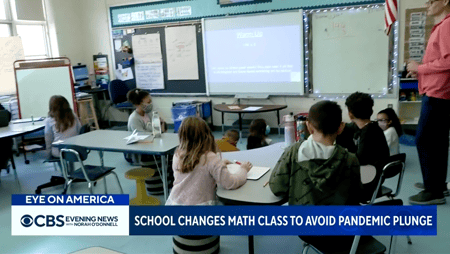
CBS News reported on how a “remarkable transformation has taken place,” even as student math scores dramatically plummeted nationwide. Meriden Public Schools saw math scores go up for most elementary schools in the district, even in the face of overwhelming odds. The reason for Meriden Public School’s academic resilience has much to do with how the district laid the groundwork well before the pandemic hit.
Long before the onset of the pandemic, Meriden Public Schools had a comprehensive approach to math instruction which included a visual instructional program that allows students to build their problem-solving skills and persevere. When Covid hit and students transitioned to distance learning, they were still able to play ST Math. School districts nationwide eventually saw a decline, but math scores remained high for many schools in Meriden, CT.
Keep Reading...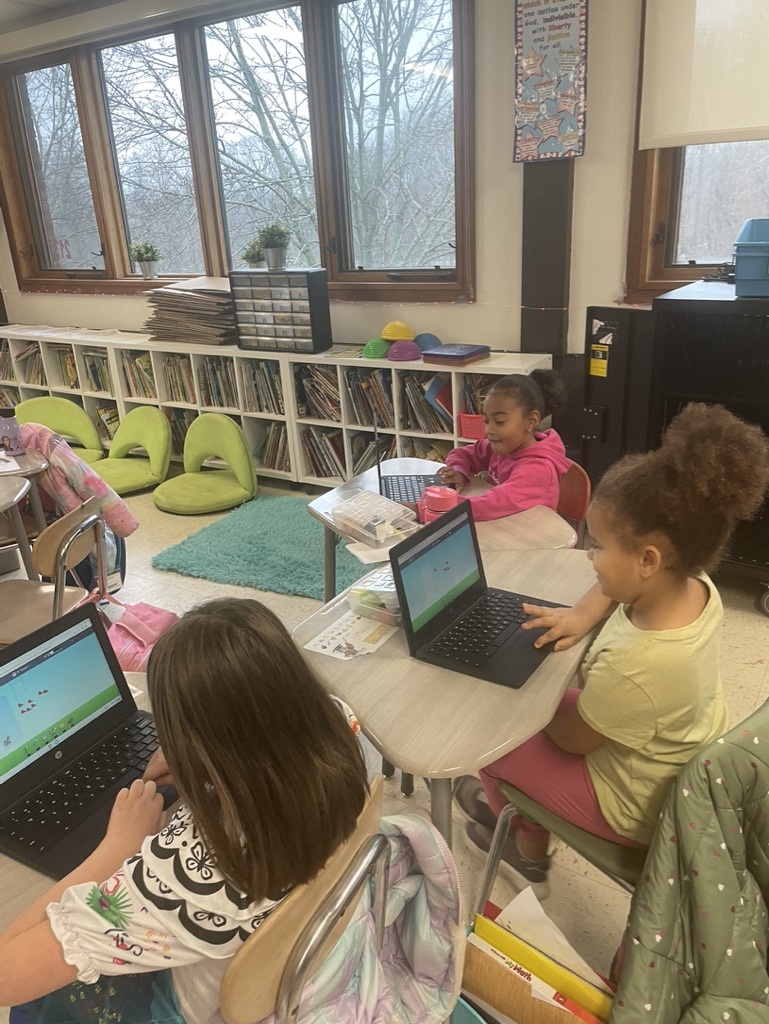

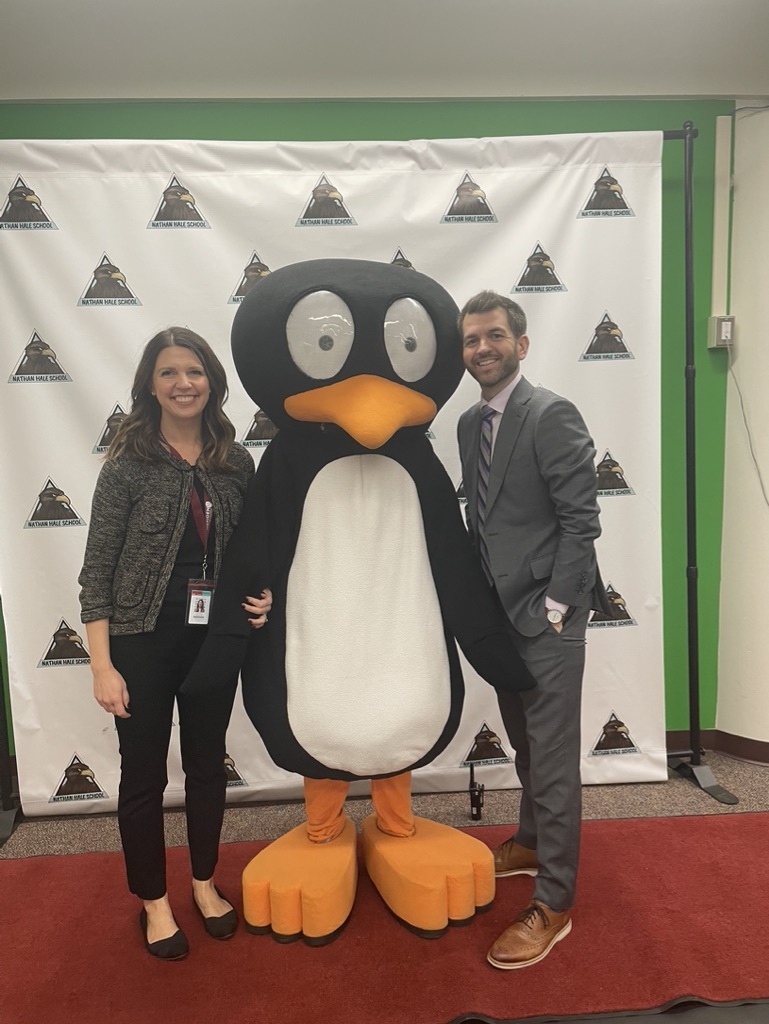
Math Learning that Stands the Test of Time
ST Math is used in all elementary classrooms in Meriden Public Schools. ST Math continues to be aligned with the district’s math curriculum, fully supporting student math progress in the classroom and sustaining their conceptual understanding of math problems—which transcends the language barrier, making the visual-instructional program ideal for English Learners (ELs).
“It’s the ability for students to problem solve and think critically as they’re going through the process,” says Haeffner. “It’s very visual for them, so they’re able to gain a greater understanding of concepts.”
Teachers hear nothing but positive feedback from students about the engaging math program. They absorb math concepts from ST Math and are able to apply them in the classroom. Since Meriden students were introduced to JiJi, an enduring relationship with the loveable ST Math penguin continued to flourish. With a comprehensive approach to math instruction in place and JiJi as a support partner, Meriden’s math achievement remained high in the past few academically trying years.
“One of the things that I really love about ST Math is that nine times out of ten if you’re in a classroom and a student is stuck, they’re not asking the teacher,” says Susan Moore, Director of Technology. “They’re asking another student.”
Students in Meriden participate in an innovative rotation model of blended learning, separated into varying time blocks depending on the grade level. Students cycle through a structured approach to learning that involves switching between face-to-face and online engagement. ST Math plays a major part in this rotation approach, where they’re benefitting from the program while at the same time communicating with each other. “They’re working together and also writing out how to solve different math problems,” says Dan Crispino, Director of School Leadership. 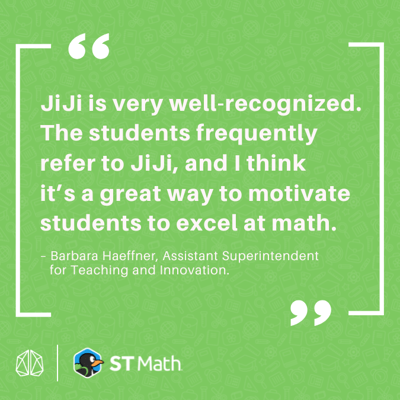
ST Math is fully aligned with the math curriculum across Meriden schools, where students not only have the opportunity to progress through ST Math puzzles, but it also supports math instruction in the classroom. In tandem with math curriculum objectives, students engage in productive struggle and build deep conceptual understanding through ST Math, which takes a visual-to-symbolic approach that perfectly translates to their math learning outside their journey with JiJi.
Pickerington Schools Outpaced Similar Schools Statewide


Based on an analysis of Pickerington's 3rd, 4th and 5th grade performance on state tests before they started using ST Math (2014) and after (2017).
The Impact of Student Engagement, Discourse, and Perseverance
MIND Research Institute, the creators of ST Math, is on a mission to change how students feel about math, to shift their perspective from "I'm not a math person" to "Everyone is a math person." In Meriden, students continue to build confidence in their math achievement, allowing them to not only grow their perseverance but equip them with the problem-solving skills and determination to keep learning—and later excel in the workforce.
Educators have also significantly benefited from ST Math. "When teachers can offer a program that kids are interested in and are excited to use—and the fact that it supplements the existing curriculum—it really is a win across the board," says Crispino.
ST Math's long lifespan among Meriden students, and its ability to continually motivate them to build math concepts, is also a testament to the program, notes Haeffner. "It's still challenging and engaging for students, and some of them have progressed through the program for their entire K-5 career. There's something to be said there."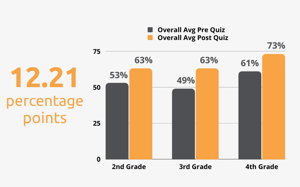
Moreover, quiz growth analysis data for the current school year has shown that, after completing ST Math learning objectives, students, on average, scored higher on math post-quizzes than on pre-quizzes. The average pre-quiz score was about 58 percent, whereas the average post-quiz was about 70 percent, showing a growth of more than 12 percentage points in math achievement.
The success behind ST Math's efficacy, students' intrinsic motivation and elevated self-beliefs, can be seen across the board. "Regardless of whether it's English learners or economically disadvantaged students, everyone is benefitting from the strategies taught in ST Math," says Crispino. "It says a lot when you can see that level of success in math learning."
Moore also wants to underscore that ST Math is far from being a new implementation in Meriden Public Schools. "For any school or district considering ST Math, one of the real benefits is the ability for students to be successful, regardless of their reading level."
"I'm in awe of watching and listening to those conversations…. And in math, the fact that they're going through the process and building conceptual understanding has been a beautiful thing to see," says Crispino. "Now the challenge is to make sure it's happening in all subject areas."
